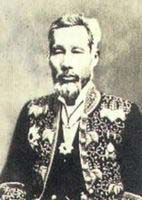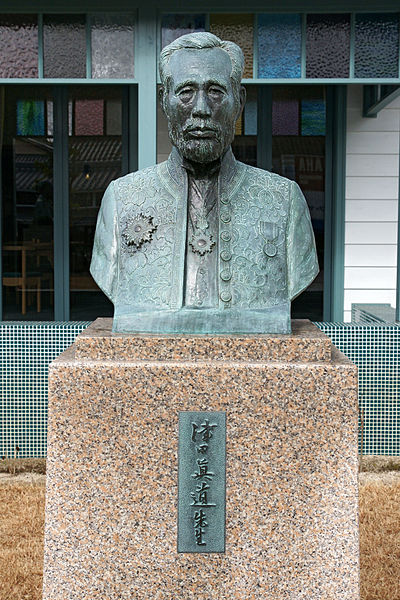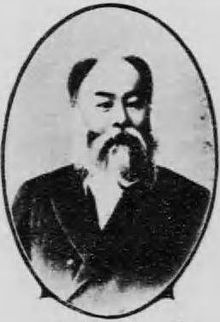<Back to Index>
- Statesman and Scholar Tsuda Mamichi, 1829
- Statesman and Scholar Kanda Takahira, 1830
PAGE SPONSOR


Baron Tsuda Mamichi (津田 真道, 25 July 1829 - 3 September 1903) was a Japanese statesman and legal scholar in the Meiji period.
Tsuda was born into a local samurai household in Tsuyama Domain (present day Okayama Prefecture). In his early days, he studied rangaku under Mitsukuri Gempo and military science under Sakuma Shozan. He became an instructor at the Bansho Shirabesho institute run by the Tokugawa bakufu to study western books and science. In 1862, he was selected, together with Nishi Amane, by the government for training in the Netherlands in western political science, constitutional law and economics. They departed in 1863 with a Dutch physician Dr. J.L.C. Pompe van Meerdervoort, who had set up the first teaching hospital for western medicine in Nagasaki.
The two Japanese students were put in the care of Professor Simon Vissering, who taught Political Economy, Statistics and Diplomatic History at the University of Leyden. They developed a genuine friendship with Vissering who was conscious of the long standing friendship between Japan and the Netherlands through Dejima. He felt that the students' desire for knowledge would make them likely future participants in Japan's modernization. Vissering, a member of La Vertu Lodge No, 7, Leyden, introduced them to Freemasonry, of which they became the first Japanese adherents on October 20, 1864.
After his return to Japan in 1868, Tsuda wrote the Kaisei Kokuho ron (On Western Law), which was the first book in Japanese on the subject. He was recruited by the new Meiji government and helped in the first codification of Japanese laws. In 1869, he drafted Japan's first laws prohibiting human trafficking, and the new national law code was promulgated in 1870. In 1871, he assisted the Foreign Ministry in negotiations with Qing dynasty China and accompanied Date Munenori to Beijing. He also served in the Genrōin and in the House of Peers of the Diet of Japan after the Japanese general election, 1890. Tsuda was also an active member of the Meirokusha, and contributed numerous articles to its journal.
He was ennobled with the title of danshaku (baron) under the kazoku peerage system.

Kanda Takahira (神田 孝平, 31 October 1830 – 5 July 1898) was a scholar and statesman in Meiji period Japan. He often used the pen name Kanda Kōhei.
Kanda was born in the Fuwa District of Mino Province, (present day Gifu Prefecture). He studied rangaku and became a teacher at the Tokugawa bakufu's Bansho Shirabesho institute for researching western science and technology.
After the Meiji Restoration, Kanda was appointed governor of Hyōgo Prefecture, and also worked for the new Meiji government as an advisor on economics and governmental structures, and was responsible for developing and implementing the Land Tax Reforms of 1873 - 1881, and for establishing local administration structures. He was appointed to the House of Peers in 1890.
His translation of William Ellis's Outlines of Social Economy in 1867 is regarded as Japan’s earliest study of western economics.
He served in the Genroin, and was afterwards appointed to the House of Peers. He was ennobled with the title of danshaku (baron) in the kazoku peerage system.